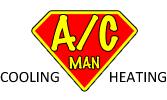Air Conditioning And The Common Cold: Is There A Link?
The human body has an amazing variety of responses to cold temperatures. But None Are The A/C Repair Company’s Fault!
The idea that cold weather is tied to the common cold is a stubborn one. Despite repeated scientific inquiries, many people still hold this mistaken assumption. The greater number of colds in winter has nothing to do with the weather – at least, not directly. Colds spread more quickly in the colder months because people spend more time indoors, coming into closer contact with other people. This allows germs to reproduce and spread more easily.
Natural cold weather doesn’t cause colds. What about rooms chilled by air conditioning? To some people’s minds, there’s a real connection between entering air conditioned spaces and contracting a cold. While I believe it’s true that exposure to cold air can make it easier to get sick, I think it’s also important to bear in mind that colds can only be caught after exposure to the cold virus. So if you’ve got a new HVAC system recently, don’t go blaming your A/c repair company for your next case of the sniffles!
Let’s take a closer look at this.
When the weather outside is warm, moving repeatedly from the sunny outdoors to the air-conditioned indoors can cause some interesting bodily reactions. Remember at this point that the warm-blooded human body takes its own steps to try and keep us at our proper 98.6-degree temperature. When you move from a warm space to a cold one, the temperature change is registered by your skin and your brain is alerted. It sends back an order for an appropriate reaction. In this case, it constricts the blood vessels in the skin to keep us warm. If you look carefully, you can actually see this happen. Many people become noticeably pale when they enter a much colder air-conditioned space. In extreme cases, people may shiver – an involuntary response designed to generate heat.
It’s not just blood vessels in the skin that constrict. The same thing happens in our noses and throats. This slows down the flow of white blood cells that fight infection, and that may make us more susceptible to contracting a virus. Remember, the virus already has to be there! If there is a virus at large, we may become more susceptible by repeatedly entering air-conditioned spaces.
Of course, this effect doesn’t happen when we make the opposite temperature change. Moving into a warmer space like the outdoors in summer reverses the process. Blood vessels dilate and increase the flow of white blood cells. This boosts our immune response and makes us less likely to contract an infection.
Air conditioning can have some real health benefits. It can relieve respiratory conditions like asthma. Your air conditioner needs to be properly cared for in order to maintain the quality of the air it moves, though. Excess moisture can promote the growth and spread of fungi, bacteria, and other unwanted contaminants. An old or poorly-maintained air conditioner may actually blast those contaminants right into your body.
How do you reduce the risk of getting sick? Always drink lots of fluids. (This keeps your throat and nose moist.) Wash your hands regularly – especially at work – to reduce virus transfer. When possible, open up a window to get fresh air into your system.
At A/C Man we are dedicated to bringing you the best HVAC repair and installation available. Don’t wait around until your old system goes out or you find yourself in need of heat this winter only to smell the mold and dust when you kick the temperature up, Call or Contact us today to get ahead of the game!
